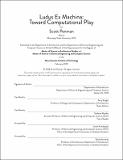Ludus ex machina : toward computational play
Author(s)
Penman, Scott (Scott David)
DownloadFull printable version (12.84Mb)
Other Contributors
Massachusetts Institute of Technology. Department of Electrical Engineering and Computer Science.
Advisor
Terry Knight.
Terms of use
Metadata
Show full item recordAbstract
The day is not far off when autonomous, artificially intelligent computational subjects will be employed in creative industries such as architecture and design. Artificial intelligence is rapidly becoming ubiquitous, and it has absorbed many capabilities once thought beyond its reach. As such, it is critical that we reflect on AI's ability to design, and on whether we are affording our creative computational counterparts the full range of tools and freedoms utilized by designers. Design is often tasked with pushing the envelope in the quest for novel meaning and experience. Designers can't always rely upon existing models to judge their work. Operating like this requires a curious and open mind, a willingness to eschew reward and occasionally break the rules, and a desire to explore for the sake of exploring. These behaviors fly in the face of traditional implementations of computation, and raise difficult questions about the autonomy and subjectivity of artificially intelligent machines. This thesis proposes computational play as a field of research covering how and why designers roam as freely as they do, what the creative potential is of such exploration, and how such techniques might responsibly be implemented in computational machines. The work argues that autotelism, defined as internal motivation, is an essential aspect of play and outlines how it can be incorporated in a computational framework. The thesis also demonstrates a proof-of-concept of computational play in the form of an autonomous drawing machine that is able to plot a drawing, view the drawing, and make decisions based on what it sees, bringing computational vision and computational drawing together into a cyclical process that permits the use of autotelic play behavior.
Description
Thesis: S.M. in Architecture Studies, Massachusetts Institute of Technology, Department of Architecture, 2018. Thesis: S.M., Massachusetts Institute of Technology, Department of Electrical Engineering and Computer Science, 2018. This electronic version was submitted by the student author. The certified thesis is available in the Institute Archives and Special Collections. Cataloged from student-submitted PDF version of thesis. Includes bibliographical references (pages 101-104).
Date issued
2018Department
Massachusetts Institute of Technology. Department of Architecture; Massachusetts Institute of Technology. Department of Electrical Engineering and Computer SciencePublisher
Massachusetts Institute of Technology
Keywords
Architecture., Electrical Engineering and Computer Science.